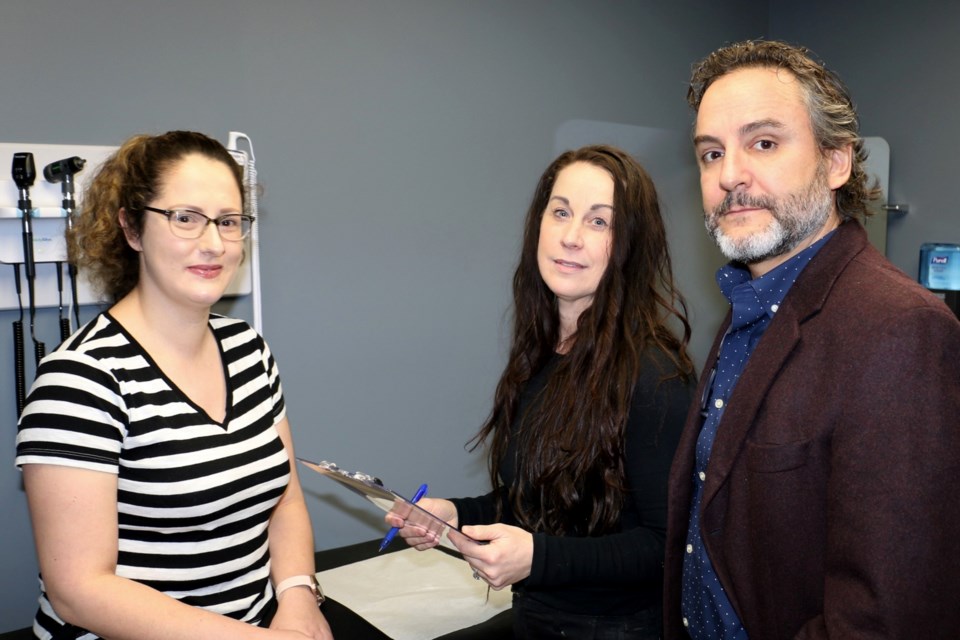Pain has become such a part of the human condition that people write jokes about it. They write books and even movies about it. The number of songs that talk about pain is off the charts.
But sadly, chronic pain is nothing to sing about.
In Sudbury, members of the medical community have responded to a growing demand and created Northern Ontario's first private pain clinic.
Pain Pathway North is the new clinic at 1536 Lasalle Boulevard that opened Tuesday morning.
Kim Brouzes, a Certified Athletic Therapist in Sudbury, has partnered with physician Dr. Dennis Reich, to open the new clinic in response to what Brouzes said was a demand for a facility to help people manage their pain.
"Well, we're hoping to aim for the functional pain patient; meaning someone who's trying to go to work, raise their family, get to hockey practice, but they're not sleeping well, or they're not functioning well. And we're hoping to fill that void to make everybody's life a little bit better."
Reich said there are so many types of pain that people suffer from; some of it involving old injuries, some of it involving weight issues, and some types of pain are the result of mental health concerns. He said modern pain management requires a multidisciplinary approach and a full assessment to discover what things in your life influence that chronic pain.
"So chronic pain is a huge problem across Canada; it's a huge problem globally. Many people think they just have to live with it. And sometimes, you know, you have underlying depression. What I'm trying to say is that sometimes those kinds of things need to be dealt with," Reich said.
“There's no perfect solution, but we're trying to basically do what we can for the North because we really are limited in what is offered up here."
One of the realities of a private clinic is that its services are not covered by OHIP (Ontario Health Insurance Plan). There are pain management services available through physicians and at Health Sciences North (with physician referral) but often there is a waiting list.
Also, while some common procedures might get OHIP coverage, Reich said patients will generally need to have coverage by private insurance or some method of private payment. In a lot of cases, he said, employee benefit packages do provide coverage for private services.
Brouzes said in some cases where other pain management procedures have not worked out for a patient, some employers may opt to have their workers treated at a private clinic.
Brouzes said treatment is more than just showing up, getting some procedures or advice and being sent on your way.
"Well, we have a multidisciplinary approach. So on day one, you would come in and we would do what's called a musculo-skeletal and neuro exam. And we also have the files from your doctors and all the things people have tried, right?," Brouzes explained.
She said that could be followed by consultations with a nutritionist, or a counselor, interviews with the patient to learn about their daily lives; all to help create a profile of the patient and to help choose a program of care.
"So we have to understand the person as a whole and what their world looks like, you know, on a daily basis, so that we can give them everything we can to help them," Brouzes said.
Another issue with respect to pain management is the fact that some medications can be addictive. Reich said the worry about opioids is a valid concern and there are ways to deal with it.
"And so one of the things we're going to be doing as part of our program is really offering some pretty sophisticated genetic testing to actually identify the likelihood that you would actually become addicted. Or potentially not have any benefit from certain medications," Reich said.
He said it can happen easily enough when a person has an injury or surgery and a person is given opioids to deal with pain and then develops an addiction.
"What if we could flag those people beforehand, and actually have it so that we know you're likely to become addicted or likely to have problems with this medication?" Reich asked.
He said those procedures exist now and will be offered as part of the program.
Another option that patients can explore is the idea of using cannabinoids, a derivative of the cannabis plant.
"Cannabinoids are a burgeoning and an important part of the future of healthcare,” Reich said. “They've been for too long looked upon as something that should be avoided, only because we didn't really understand it."
He said as medical science moves forward, more will be learned about the effectiveness of cannabis for pain management.
"But now we're going to start hearing about these medications being prescribed, right. And actually having utility, but those studies have to be done. Those just have to be identified. And we will be working with cannabinoids as part of our regime," Reich said.
Reich and Brouzes said one of the things they are most pleased about in opening their new clinic is that several well-known Sudbury physicians and health care specialists are stepping up and stepping forward to work with them in providing pain management solutions.
Len Gillis covers health care and mining for Sudbury.com.
